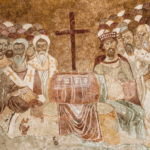Why did Jesus go to the Cross? If you are looking for an encouraging exercise this Good Friday, you might like to try to make a list of all the different reasons you can think of. If you can’t wait, here is ours:
1. To satisfy God’s justice
By coming forward as our representative and substitute, and by enduring the penalty for our sins, Jesus not only made us right with God, he demonstrated God’s mercy and justice.
God put [Jesus] forward as a propitiation by his blood, to be received by faith. This was to show God’s righteousness, because in his divine forbearance he had passed over former sins. It was to show his righteousness at the present time, so that he might be just and the justifier of the one who has faith in Jesus. (Rom 3:25-26)
2. To vindicate God.
Jesus’ suffering proves his faith and makes him the true brother of all who trust in God
God is glorified when his people endure suffering because of their trust in him. Thus, the writer of Hebrews declares that it was “ …fitting that he, for whom and by whom all things exist, in bringing many sons to glory, should make the founder of their salvation perfect through suffering.” (Heb 2:10) Jesus’ suffering proves his faith (v13) and makes him the true brother of all who trust in God (v11-12). The apostle Peter similarly encourages us to think about this when we find ourselves in all kinds of difficult relationships:
When he was reviled, he did not revile in return; when he suffered, he did not threaten, but continued entrusting himself to him who judges justly. (1Pet 2:23)
3. To demonstrate God’s love.
The apostle John tells us that if we want to know what God thinks of us then there is one place to look:
In this the love of God was made manifest among us, that God sent his only Son into the world, so that we might live through him. In this is love, not that we have loved God but that he loved us and sent his Son to be the propitiation for our sins. (1John 4:9-10)
The apostle Paul agrees. If we want to know how God will treat us in the future the cross of Jesus shows us:
If God is for us, who can be against us? He who did not spare his own Son but gave him up for us all, how will he not also with him graciously give us all things? (Rom 8:31-32)
4. To show forth God’s wisdom and defeat pride
We flatter ourselves as wise people and spiritual people. God responds by saving us through the least wise and spiritual thing imaginable—a corpse on a cross
Paul describes how the apparent weakness and folly of the cross expose the pretension and pride of us humans. We flatter ourselves as wise people and spiritual people. God responds by saving us through the least wise and spiritual thing imaginable—a corpse on a cross:
For since, in the wisdom of God, the world did not know God through wisdom, it pleased God through the folly of what we preach to save those who believe … For the foolishness of God is wiser than men, and the weakness of God is stronger than men. (1Cor 1:21,25)
5. To perfect Jesus.
God is not the only one vindicated by Jesus’ trust and obedience. Jesus himself is altered by the experience. As Jesus honours God with his obedience he “perfects” (c.f. Heb 2:10) his claim to be the true man who is worthy to rule the world on God’s behalf. Both Paul, in Philippians 2:8-10, and the writer of Revelation make Jesus’ suffering his main qualification for his exaltation:[1]
… he humbled himself by becoming obedient to the point of death, even death on a cross. Therefore God has highly exalted him and bestowed on him the name that is above every name … (Phil 2:8-9)
“Worthy are you to take the scroll [of history] and to open its seals, for you were slain, and by your blood you ransomed people for God from every tribe and language and people and nation …” (Rev 5:9-10)
6. To put Jesus at the centre of everything.
Of course we could say a lot more about the “perfection” of Jesus. His suffering makes him a sympathetic high priest (Heb 2:17) and the purifier of heaven (Heb 9:23-27). It makes him the champion of those he ransoms by his blood. It is the means by which he receives his kingdom. All this is part of God’s plan to “unite all things in [Jesus]” (Eph 1:10); to make Jesus the life-giver (John 5:21) so that all would “honour the Son, just as they honour the Father,” (John 5:23). The writer of Hebrews sums it up in his own way:
… in these last days [God] has spoken to us by his Son, whom he appointed the heir of all things … After making purification for sins, he sat down at the right hand of the Majesty on high, having become as much superior to angels as the name he has inherited is more excellent than theirs. (Heb 1:1,3-4)
7. To deal with our sin and its consequences.
The Bible describes the atoning work of Jesus using a range of different terms which all relate to the way sin breaks our relationship with God. Insofar as sin imprisons us in godless exile, Jesus death redeems us and makes us free to approach God (Eph 1:7). Insofar as justice says that evil creates a debt (and evildoers should be repaid for their evil), the death of Jesus expiates that debt (1John 4:10). Insofar as God himself is grieved and angered by our rebellion, the blood of Jesus propitiates [2] God’s righteous wrath (Rom 3:25). Insofar as our sin defiles us before our Holy God, Jesus blood purifies and sanctifies us (Heb 9:13; Rev 7:14).
8. To win himself a people.
We, the people Jesus saves, now belong to him because he bought us with his blood (1Cor 6:19). We are saved – not just from sin and death but for Jesus himself. We are his bride and his body. As Paul writes to Titus:
[Jesus] gave himself for us to redeem us from all lawlessness and to purify for himself a people for his own possession who are zealous for good works. (Tit 2:14)
9. To destroy Satan and his works.
How does Christ destroy the devil? By taking on himself the charges levied against us
“The reason the Son of God appeared was to destroy the works of the devil,” writes John in 1John 3:8. The writer of Hebrews similarly declares that Jesus’ physical sufferings were so that “through death he might destroy the one who has the power of death, that is, the devil.” How does Christ destroy the devil? By taking on himself the charges levied against us. In both Testaments, Satan is the prosecutor—the one who accuses us of our sins before God (Job 1; Zech 3:1; Rev 12:10). But Jesus has defanged him by taking the penalty of our sins on himself. As Paul writes:
God made [us] alive together with him, having forgiven us all our trespasses, by canceling the record of debt that stood against us with its legal demands. This he set aside, nailing it to the cross. He disarmed the [heavenly] rulers and authorities and put them to open shame, by triumphing over them in him. (Col 2:13-15)
10. To become Lord of the Living and the Dead.
One of the tantalising theories about Jesus mission that may be true, but is hard to absolutely prove, is the idea that his story revisits and corrects the stages of human life (and history) and thus becomes the new source and template for our existence. However true that is in general, it is certainly true that Jesus’ death gives him a right to rule over us with regard to our living and dying:
For if we live, we live to the Lord, and if we die, we die to the Lord. So then, whether we live or whether we die, we are the Lord’s. For to this end, Christ died and lived again, that he might be Lord both of the dead and of the living. (Rom 14:8-9)
In Paul’s context, he means that we should stop picking at each other and fix our eyes on Jesus. In our lives and deaths—indeed in all our circumstances—he alone has the right to judge and rule us because he alone has earned that right by his perfect example. He alone can show us how to live and die. What a great comfort and challenge to conclude with this Easter.
[1] Which is especially remarkable given that Jesus as God the Son is entitled to every honour as Creator and Sustainer. Nonetheless, the work of salvation is even greater than creation (John 5:20) and it is in this action—expressed within the human story of Jesus—that God the Father chooses to honour his Son.
[2] Though the basic Greek word is the same, the meaning is different when directed to God or sins.















